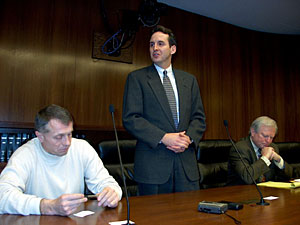|
Photos
More from MPR
Respond to this story
|
State's top leaders contemplate budget fix
December 11, 2002
St. Paul, Minn. — (AP) - Campuses won't be closed but tuition may rise. State aid for cities and counties won't disappear but it may only go to the neediest communities. And if your car breaks down on I-394, be prepared to change your own tire, because Highway Helpers may not be around anymore.
Those were among the bits of advice the state's next governor and the leaders of the House and Senate offered Tuesday on how the state's budget troubles may affect people.
In a forum sponsored by The Associated Press, the leaders agreed that the state's budget morass may well get worse before it gets better.
Gov.-elect Tim Pawlenty said the prospect of war or another terrorist attack could deepen the hole the state must face.
The next budget forecast - the one lawmakers will actually base a budget on - is due in late February or early March. The process begins with Pawlenty submitting his budget, due by Feb. 18.
Pawlenty held to his no-tax-increase campaign pledge, saying he expects citizens to rally as if they were facing a natural disaster.
"This is the equivalent of a fiscal tornado, of a fiscal flood, of a fiscal blizzard," he said. "Minnesotans rally around each other in times of crisis."
Among the ways Minnesotans may find themselves affected by the disaster, according to House Speaker Steve Sviggum:
-Tuition at state colleges and universities may rise;
-The state's planning agency may disappear;
-Highway Helpers, which help stranded motorists, may be garaged;
-Part of the state's $900 million tobacco endowment may disappear, and the state may try to cash in the expected 20 years of direct payments from tobacco companies so it can use them all this year.
Public safety, schools, nursing homes, care for the disabled and clean air and water efforts will be among Republicans' priorities, he said.
"Everything else is on, pretty much, thin ice," said Sviggum, R-Kenyon.
Pawlenty and Sviggum, both Republicans, said they'll apply a "cost-benefit" analysis to government services. But Senate Majority Leader John Hottinger, a DFLer, said his caucus is going to take a slightly different approach to the budget plans.
"We're going to ask who is it going to cost, and who it is going to benefit," Hottinger said.
Hottinger stressed that, though Democrats may be facing a two-on-one situation, they are going to be loud in explaining the potential pain from Pawlenty's budget plan, expected by mid-February.
Even Pawlenty and Sviggum don't agree on all budget matters. Sviggum said he would support increasing the gasoline tax to pay for road improvements. Pawlenty has ruled that out.
Pawlenty, while stressing that he plans "bold and clear and decisive action" on the budget, also said that one possible way of eliminating the $4.56 billion budget problem is to keep spending at levels from the last two-year budget.
"We say to state government, you've got to live with what you got last year," he said. "It may not be a matter of cutting."
He acknowledged, though, that inflation, spiraling health care costs, and increased demands for state services spurred by the economic downturn make such a solution more difficult than it sounds.
|
News Headlines
|
Related Subjects
|

